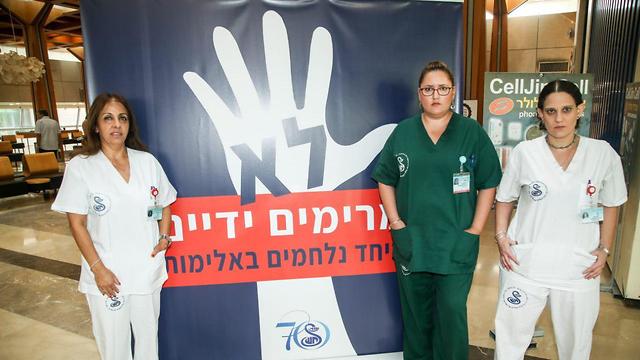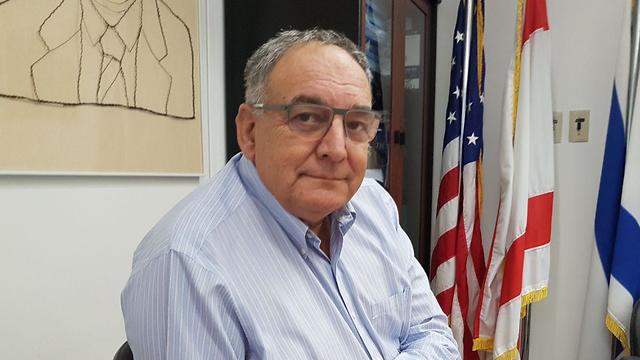
Nurses strike averted, security to be increased
Ministry of Health announces an end to the crisis, concrete steps to be taken to curb violence against medical personnel, reduce overcrowding, increase emergency room, psychiatric, staff.
The National Association of Nurses announced Tuesday that significant progress had been made in negotiations with representatives of the Ministry of Finance and the Ministry of Health on the matter of hospital violence. A short time later, the Health Ministry spokesman announced that the negotiations had borne fruit and the strike was cancelled.
The Finance Ministry agreed to fund a significant increase in hospital security as well as additional health care staff positions.
The nurses' association said that "there was a breakthrough in all the subjects that were discussed, including the heavy workloads in the wards, security at health institutions and the implementation of punishment and enforcement clauses."
The parties agreed to add 100 additional nurse positions in the psychiatric system, Tipat Chalav well-baby clinics and pediatric hemato-oncology departments. In addition, it was agreed to add more emergency room nurses, but the number will be determined in another hearing to be held by the end of the year.
It was also decided to implement the decisions of the Mor Yosef Committee, which was established after the murder of Nurse Tova Carrero, but no budget has yet been decided on.
Chairman of the Histadrut Labor Federation Avi Nissenkorn said at the end of the talks that "the personal safety of the medical staff is above all else." Nissenkorn added that he supports the head of the nurses association Ilana Cohen and the chairman of HMO staff union, Prof. Ben Hamo, for "outstanding leadership " and thanked Deputy Minister Health Yaakov Litzman and Finance Minister Moshe Kahlon for their commitment to solving the crisis.
"We succeeded in bringing about a significant (budget) increase to the health system while strengthening the personal safety of medical staff," said Litzman. Health Ministry Director General Moshe Bar Siman Tov said that "these are very important achievements for the nurses, but also for the entire system."
The national nurse’s strike began Tuesday in most Israeli hospitals after the talks reached a dead end Monday. As part of the strike, the nurses' union announced that hospitals would not perform non-urgent surgeries, intensive care units would operate in a limited format, and that the services at family health clinics (Tipat Chalav) would only be given to pregnant women at risk.
Prof. Rafi Beyar, Director of Rambam Medical center in Haifa said that 27 out of 40 surgeries scheduled for Tuesday were cancelled.
"My heart aches for the patients who have been waiting for weeks and months, and have arrived at the hospital that cannot operate on them," said Beyar, "but I understand the distress of the nurses. We experience violence all too often, not only towards nurses, but also towards security staff, doctors and sometimes other administrative staff. I think we are not doing enough about this."
On the other hand, the director of Jerusalem’s Hadassah Ein Karem Hospital, Prof. Ze'ev Rothstein, accepted the strike with mixed feelings and only held a protest meeting during which the nurses were instructed in how to avoid further cases of violence.
"I do not think that the solution to violence lies in security guards next to every bed in the hospital," Rothstein told Ynet. "We learned that security personnel were (often) the trigger for a violent outbreak, so I do not think that emergency rooms should have security guards in every corner, but we recognize circumstances in which violence erupts and security personnel must be able to react quickly."
"The most important thing to do is to educate staff to provide services with minimal conflicts, even under pressure and against a backdrop of stressed and pained patient’s families. The staff can be taught how to work with minimal friction that can lead to physical violence. It won’t prevent 100% of cases of violence, but it will definitely decrease such incidents,” he explained.
According to Health Ministry figures, an average of three medical personnel are attacked every day. "The nurses in the State of Israel have declared that they will not be tread upon," said the chairwoman of the National Association of Nurses, Ilana Cohen.
"We called for an all-out strike until action is taken to resolve the unbearable overcrowding and protect the medical teams and health workers. It is absurd for a nurse to take care of a patient and end up in the emergency room. The government must not stand on the sidelines,” Cohen said.
About nine months ago, a committee headed by Prof. Shlomo Mor-Yosef submitted its recommendations to eradicate the phenomenon of violence in hospitals. Among other things, the committee decided to expand the authority of hospital security guards, place police officers in emergency rooms, increased penalties for those attacking medical personnel, and to develop an app with a distress button. However, many of the recommendations have yet to be implemented.












